Prostratin, PKC activator
Synonym(s):12-Deoxyphorbol-13-acetate;CCRIS 6292;NSC 623310
- CAS NO.:60857-08-1
- Empirical Formula: C22H30O6
- Molecular Weight: 390.47
- MDL number: MFCD00674138
- SAFETY DATA SHEET (SDS)
- Update Date: 2025-01-27 09:38:02
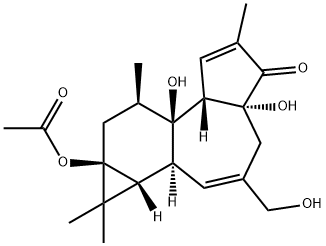
What is Prostratin, PKC activator?
Description
Activation of latent reservoirs of HIV-
The Uses of Prostratin, PKC activator
It is a protein kinase C activator found in the bark of the mamala tree of Samoa, Homalanthus nutans (Euphorbiaceae). Research indicated that prostratin has potential to be useful in the treatment of HIV as it flushes viral reservoirs in latently infected CD4+ T-cells.
The Uses of Prostratin, PKC activator
Activation of latent reservoirs of HIV-infected cells is a treatment strategy designed to reduce viral load and eliminate the perpetuation of retroviral infection. Prostratin is a non-tumor promoting phorbol ester that potently induces HIV-1 reactivation in latent reservoirs of infected Jurkat-LAT-GFP cells . [Cayman Chemical]
What are the applications of Application
Prostratin is a PKC (Protein Kinase C) activator and potential HIV infection inhibitor that does not induce tumor formation.
Definition
ChEBI: A natural product found in Euphorbia fischeriana.
Biochem/physiol Actions
Prostratin, an unusual non-tumorigenic phorbol ester, is an activator of protein kinase C (PKC) and also an activator of nuclear factor KB (NF-KB) mediated through activation of the IKKs (IKB kinases). Prostratin exhibits potent in vitro activity by inducing HIV expression in latently infected cell lines and primary cells, thus antagonizing HIV latency. Activation of PKC and NF-kB has been proposed as the mechanism of action. Prostratin also inhibits HIV entry into target cells by down-regulating CD4 and CXCR4 receptors.
References
1) Cashmore et al. (1976), The structure of prostratin: a toxic tetracyclic diterpene ester from Pimelea Prostrata; Tetrahedron Lett., 17 1737 2) Miana et al. (2015), Prostratin: An Overview; Mini Rev. Med. Chem., 15 1122 3) Shen et al. (2015), The protein kinase C agonist prostratin induces differentiation of human myeloid leukemia cells and enhances cellular differentiation by chemotherapeutic agents; Cancer Lett., 356 (2 Pt. B) 686 4) Biancotto et al. (2004), Dual role of prostratin in inhibition of infection and reactivation of human immunodeficiency virus from latency in primary blood lymphocytes and lymphoid tissue; J. Virol., 78 10507 5) Geribaldi-Doldan et al. (2015), 12-Deoxyphorbols Promote Adult Neurogenesis by Inducing Neural Progenitor Cell Proliferation via PKC activation ; Int. J, Neuropsychopharmacol., 19 pyv085
Properties of Prostratin, PKC activator
| Melting point: | 216-219℃ |
| Boiling point: | 550.5±50.0 °C(Predicted) |
| Density | 1.31 |
| storage temp. | -20°C |
| solubility | Soluble in DMSO at 30mg/ml |
| form | white powder |
| pka | 11.40±0.70(Predicted) |
| color | Off-white |
| Stability: | Stable for 1 year from date of purchase as supplied. Solutions in DMSO may be stored at -20°C for up to 1 month. |
Safety information for Prostratin, PKC activator
Computed Descriptors for Prostratin, PKC activator
New Products
3-Iodophenylacetic acid 3-Pyridineacetonitrile, α-hydroxy- 2-Propanamine, 1-chloro-, hydrochloride (9CI) 3-(hexyloxy)-4-(pyridin-3-yl)-1,2,5-thiadiazole 2-Hexyn-1-ol Dibenzo-18-crown-6 Nickel(II) perchlorate hexahydrate, 98% 4-Bromophenylacetonitrile, 95% 3-Bromo-4-fluoroaniline, 97% Sodium tetraborate decahydrate, 98% Palladium(II) acetate, trimer, Pd 99% 4-Bromo-2-chlorotoluene, 97% N N Dimethylformamide Dimethyl Acetal (Dmf Dma) 2,3-Dichloro Benzoyl Cyanide [Side Chain] Bis(2-Chloroethyl) Amine Hydrochloride L-Glutamic Acid Diethyl Ester Hydrochloride 5-(Difluoromethoxy)-2-Mercaptobenzimidazole 1-Ethyl-3-(3-Dimethylaminopropyl)-Carbodiimide Hydrochloride [EDC Hcl] 1,4-Napthoquinone Bromoiodomethane Sodium Bicarbonate Methylene Dichloride (MDC) Ethyl Acetate Indole-3-Carbinol (I3C)Related products of tetrahydrofuran
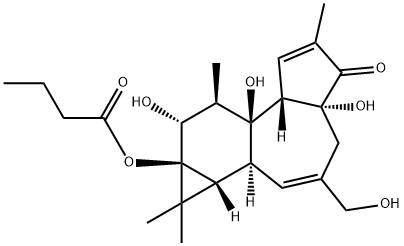
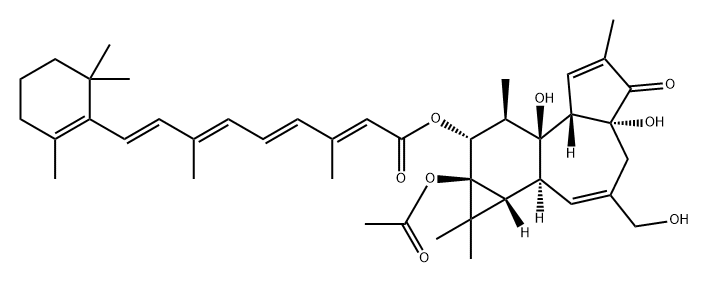
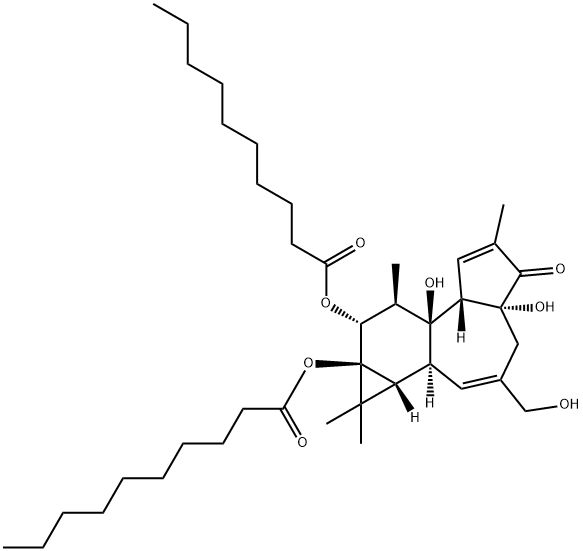
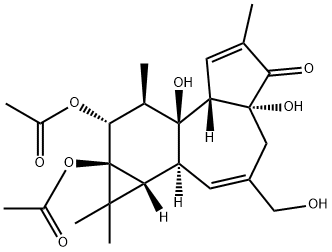

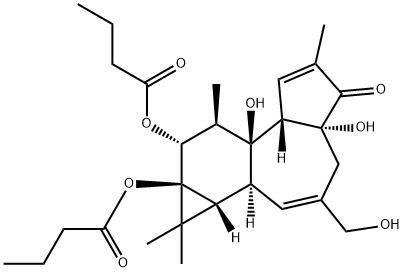
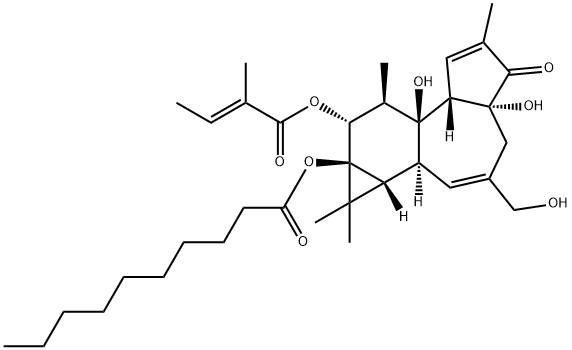
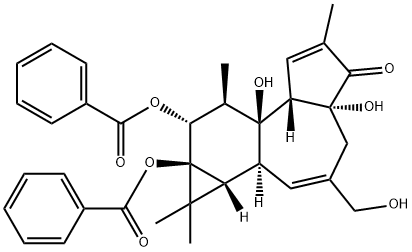
You may like
-
 Prostratin CAS 60857-08-1View Details
Prostratin CAS 60857-08-1View Details
60857-08-1 -
 17604-74-9 3-Pyridineacetonitrile, α-hydroxy- 98+View Details
17604-74-9 3-Pyridineacetonitrile, α-hydroxy- 98+View Details
17604-74-9 -
 131987-69-4 98+View Details
131987-69-4 98+View Details
131987-69-4 -
 Cyclohexane, (2-propynyloxy)- 67967-07-1 98+View Details
Cyclohexane, (2-propynyloxy)- 67967-07-1 98+View Details
67967-07-1 -
 764-60-3 2-Hexyn-1-ol 98+View Details
764-60-3 2-Hexyn-1-ol 98+View Details
764-60-3 -
 2-Propanamine, 1-chloro-, hydrochloride (9CI) 98+View Details
2-Propanamine, 1-chloro-, hydrochloride (9CI) 98+View Details
5968-21-8 -
 3-Iodophenylacetic acid 1878-69-9 98+View Details
3-Iodophenylacetic acid 1878-69-9 98+View Details
1878-69-9 -
 132945-75-6 (S)-1-Boc-3-methanesulfonyloxy-pyrrolidine 98+View Details
132945-75-6 (S)-1-Boc-3-methanesulfonyloxy-pyrrolidine 98+View Details
132945-75-6
